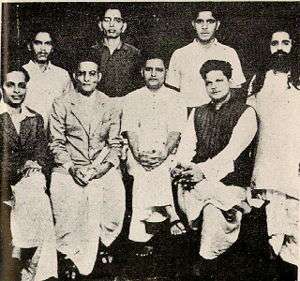Digambar Badge

Digambar Badge was one of the Indians arrested for the conspiracy to assassinate Mahatma Gandhi. Badge (pronounced Bahdgay) turned approver and deposed as a prime prosecution witness.[1] It was his confession that led to the prosecution case and charges against the others accused of conspiracy. Though he confessed to participating in the assassination plot, and admitted guilt, the prosecution granted him a pardon deal in exchange for his testimony against the others accused.[1]
Badge was a Shudra Hindu from Maharashtra who grew up in Challisgaon near Kasoda, a school drop out who did a variety of temporary jobs to earn his livelihood. He participated in non-violent civil disobedience movement (satyagraha) in Pune, then collected funds for charity by begging door to door.[2] Badge began buys knives and daggers, reselling them near the Muslim ruled Hyderabad State border where Hindus were fighting against alleged persecution.[2] This brought him into contact with members of the Hindu Mahasabha. In 1947, he expanded his business to include firearms and ammunition. His business, and the desire of Nathuram Godse and Narayan Apte to acquire arms for the assassination brought him in contact with them. Badge employed Shankar Kistayya (co-accused in the conspiracy plot), a rickshaw puller and houseworker, to deliver his weapons and firearms to his customers.[2]
Badge's evidence lacked independent corroboration, a common flaw in conspiracy cases. Nevertheless, Judge Atma Charan accepted Badge as a truthful witness. "He gave his version of the facts in a direct and straight-forward manner. He did not evade cross-examination or attempt to evade or fence with any question".[3]
References
- 1 2 G.D. Khosla (1965), The Murder of the Mahatma, Chief Justice of Punjab, Jaico Publishers, pages 15-16
- 1 2 3 G.D. Khosla (1965), The Murder of the Mahatma, Chief Justice of Punjab, Jaico Publishers, pages 25-27
- ↑ http://www.hindu.com/fline/fl2006/stories/20030328003603400.htm